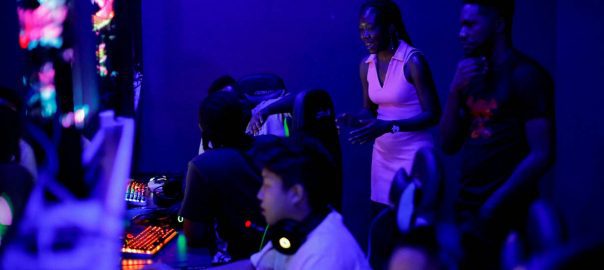ACCRA, Sept 8 (Reuters) – A keypad-locked door in Ghana’s capital Accra hid a neon-lit hall of flickering processors, clicking keyboards and excited voices. The young crowd erupted as brother beat sister in a tight-fought but good-spirited round of Mortal Kombat.
British-Ghanaian gamer Annabel Ashalley-Anthony smiled at her brother Adam, after the tournament match at a gaming hub organized by Melanin Gamers, a collective she hopes will change the video game landscape.
Four years ago, Ashalley-Anthony and her two brothers established a crew of video game enthusiasts dedicated to providing a safe space for online gamers of diverse ethnicities, sexual orientations and gender identities.
Melanin Gamers has accrued more than 4,000 members worldwide since then, and has hosted tournaments sponsored by industry giants like Electronic Arts (EA.O) and Ubisoft (UBIP.PA).
After her brother Alan was harassed online for the color of his skin, Ashalley-Anthony made it her mission to build a community where people could play together away from the racism, misogyny and homophobia sometimes associated with online games.
“Why is it always like, ‘Oh, someone’s saying something, better mute your mic’? ‘Turn your camera off so no one knows,'” she said.
“All of these things are things the victim has to do because of the bully. So I thought, why not get rid of the bully?”
Less than 4.5% of the world’s gamers lived in sub-Saharan Africa last year, market data from Statista showed. But cheaper data costs could help the market grow 12% annually through 2026, according to research firm Mordor Intelligence.
Ghana is one of the countries leading the way. The West African nation had the continent’s second highest per-capita gaming population in 2021, with 27% of citizens actively playing, according to Esports analytics leader Newzoo.
The country’s only two gaming hubs opened in the past year on the back of this boost in popularity, each serving as tournament and meeting points for some Melanin Gamers events.
Showing Ghanaians that there are viable career options in gaming is as much a part of the Melanin Gamers mission as anything else, British-born Ashalley-Anthony said.
One member doing just that is Ghanaian-Nigerian streamer Ritalucia Henry-Andoh. She makes around $100 per month streaming and commentating on video games, and aims to make it her full-time job by the end of the year.
She hosted her own tournament last month, featuring Melanin Gamers and others from Ghana and around the world.
“White, black, male, female, trans, non-binary – whatever you are, we will accept you because we’re a crew of accepting people who are finding more accepting people,” she said.
“Gaming is for everyone, and I think we should do more to be kinder.”

